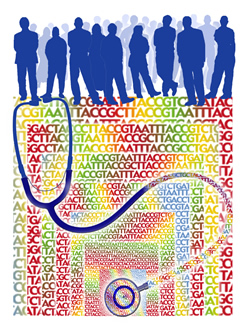Last updated: October 24, 2012
New Web Portal Expands View of Genetic Association Data for Researchers
New Web Portal Expands View of Genetic Association Data for Researchers
By Geoff Spencer
NHGRI Staff Writer
 Researchers can now select a physical trait or phenotype and find the genomic variants associated with it, to date, by using a new web portal, called the Phenotype-Genotype Integrator (PheGenI, pronounced FEE-GEE-NEE).
Researchers can now select a physical trait or phenotype and find the genomic variants associated with it, to date, by using a new web portal, called the Phenotype-Genotype Integrator (PheGenI, pronounced FEE-GEE-NEE).
PheGenI permits researchers to view a tabular display of genome-wide association study results for DNA sequence variations, genes and gene expression differences for a given trait such as asthma or diabetes. The results are linked to their source databases where researchers can then dig deeper into the detailed data.
PheGenI also includes graphical displays by chromosome (ideogram) and a DNA sequence viewer that shows the relationships between genetic variants in the human genome at the nucleotide level.
"PheGenI helps build the knowledge base that is crucial to accelerating research on genetic variation among basic scientists. It will also allow clinical researchers and epidemiologists who are unfamiliar with such data to explore genetic variation and phenotype data that are related to the diseases they study," said Lucia Hindorff, Ph.D., an epidemiologist in the National Human Genome Research Institute's (NHGRI) Office of Population Genomics. Dr. Hindorff developed the idea for PheGenI in response to the National Institutes of Health's increasing emphasis on genomic-based medicine.
Along with her collaborator Erin Ramos, Ph.D., also an epidemiologist in NHGRI's Office of Population Genomics, Dr. Hindorff reached out to staff at the National Library of Medicine's National Center for Biotechnology Information (NCBI) to build PheGenI.
PheGenI pulls genetic and genome-wide association studies (GWAS ) data from multiple NIH databases and presents it to the user in a compact, organized fashion. Presented data show the places in the genome that have been related to a user-specified disease or trait, or, inversely, the traits that have been related to a user-specified region of the genome. The data shown include physical traits, diseases, sequence variations, genes and gene expression levels. The data are drawn from genetic association results submitted to NCBI's database of Genotypes and Phenotypes (dbGaP); data incorporated in the Genotype-Tissue Expression Project (GTEx); and genetic associations published in the scientific literature and curated by the NHGRI Catalog of Genome-Wide Association Studies.
Genome-wide association studies have uncovered thousands of novel genetic variants associated with common diseases, each contributing a modest risk to disease. However, data from such studies is often located in disparate databases that are hard to find, operate or integrate for analysis. PheGenI users can explore the relationships between variants, traits, expression levels and genes to understand the genetic contribution to phenotypic traits as revealed by current research.
According to Drs. Hindorff and Ramos, in order to move these initial basic findings about novel variants into the clinic, researchers will need to conduct numerous follow-up studies to understand the genetic variants' function and to identify those that most contribute to disease.
"NHGRI and NCBI have done a great deal of the hard work up front so that PheGenI is immediately useful to the clinical and biomedical research community and the data are accessible and downloadable," said Mike Feolo, Ph.D., an NCBI staff scientist who helped build PheGenI with NCBI staff scientist Douglas Hoffman.
PheGenI users have the ability to search by phenotype, gene, chromosome location, or by genetic variant, which are called single nucleotide polymorphisms or SNPS. For example, a search of the trait "asthma" shows 88 genetic variant associations. If users scroll down the page to 'Genome View' they can see which of the 23 human chromosomes each SNP resides on. Scrolling further, users can see which genes have been associated with the SNPs.
Numerous hyperlinks to more data and information in NCBI databases are included in the search results, allowing users to broaden or narrow their exploration of the data. In the future, other databases focused on phenotypic terms, complex genomic variations and human health will be added to PheGenI.
